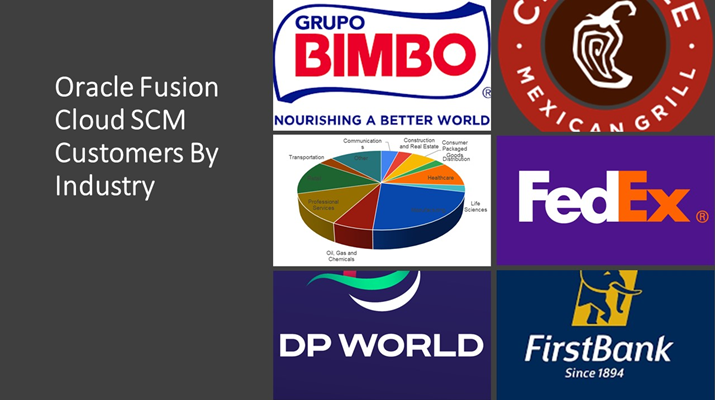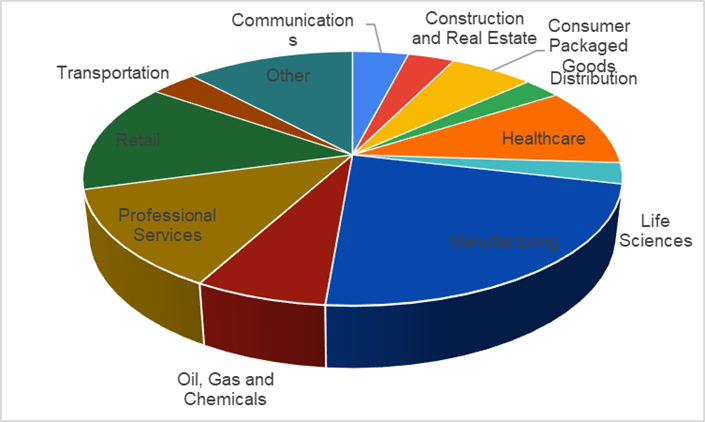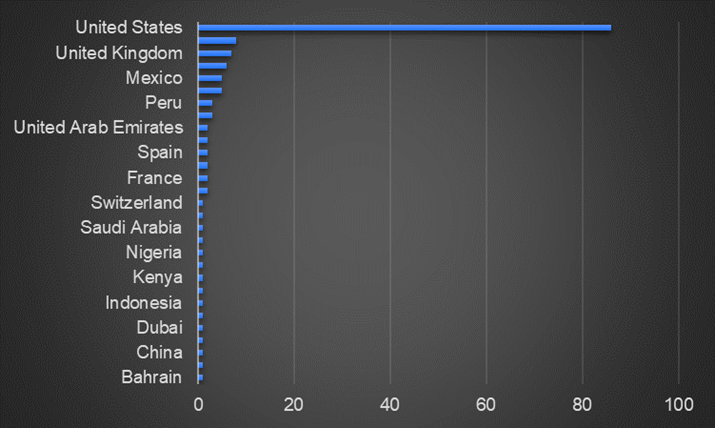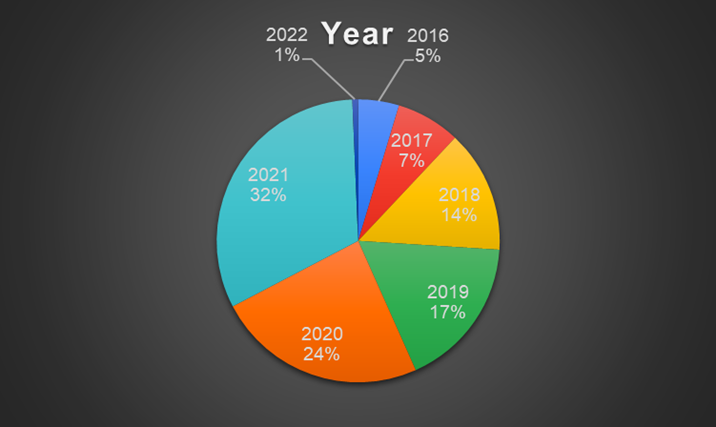As the world enters the third year of living with the pandemic and the lingering shortages of everyday essentials, companies that have embraced an integrated applications strategy early on are proving to be in a better position to withstand ongoing supply chain challenges.

An examination of 150 customers, 57% of which deployed Oracle Fusion Cloud Supply Chain & Manufacturing (SCM) between 2020 and 2022, underscores a range of benefits from real-time operational visibility to reduced transportation costs – not to mention increased efficiency – that enable companies to anticipate and accommodate huge spikes in orders, even with continuing labor and product constraints.
The study is part of ARTW’s ongoing research on Enterprise Essentials, focusing on applications that are deemed to be critical and essential for today’s enterprises that need to find lasting measures to combat current and future business process pain points exacerbated by the public health crisis.
Customers of Oracle Cloud SCM have experienced the following benefits as they summon their collective efforts, with help from the vendor and its implementation partners, to tackle their supply chain challenges:
- Order to delivery can be achieved on the same day.
- Search and pick a product in a minute with 100% product traceability.
- Inventory accuracy improves from 70% to 95%.
- Agile supply chain planning can be adjusted daily or even hourly.
- Better execution saves fuel and improves asset utilization to cut transportation costs by up to 30%.
Another catalyst behind these major implementations – some of which cost upwards of tens of millions of dollars – is that they need to be completed in a matter of weeks or months, unlike the multi-year supply chain management projects that used to bedevil companies with numerous plants and warehouses, causing them to cough up hundreds of millions of dollars to reach key milestones that never quite materialized. To wit, an industrials manufacturer was able to implement Oracle Fusion Cloud Transportation Management, part of Oracle Cloud SCM, in just a few weeks against a tight deadline and while at risk of being cut off by its former parent company’s legacy system after a divestiture.
Similarly, Chipotle, which operates nearly 3,000 restaurants mostly in the United States, was able to complete its rollout of Oracle Cloud SCM applications in the second half of 2020 despite numerous disruptions from lockdowns to supply constraints. In fact, Chipotle attributed its recovery – a 26% jump in chain-wide revenue in 2021 from 7% in 2020 – to its decision to proceed with the replacement of its E-Business Suite with wall-to-wall Cloud applications from Oracle. That enables the $7 billion eatery to quickly transform itself across different functions, from financial management to supply chain automation, in order to handle a host of complex tasks ranging from inventory control to emerging opportunities such as digital sales.
To accommodate such fast-changing requirements, Oracle upgraded its Cloud SCM offerings recently by delivering such added capabilities as a machine learning algorithm for Oracle Transportation Management for intelligent transit time predictions, automated spot bidding for enhanced shipping, multi-language digital assistants for real-time customer support and response, and new analytics that enable users to access and analyze accurate transportation and global trade data.
The lesson to learn from these 150 use cases is that the supply chain systems that companies used to depend on, which were cobbled together using best-of-breed and customized software modules from different vendors, can no longer support the structural shifts in customer demand and their behavior for years to come. Land O’Lakes, one of the recent customers running Oracle Cloud SCM, summarizes the situation this way: “We can’t go back to the way we’ve operated in the past.’’
The latest survey of these 150 Oracle customers and their implementations of Cloud SCM applications reveals the following:
Seventy-eight percent of customers cite ERP Integration and Data Interoperability as their top reason for purchasing Oracle Cloud SCM, followed by 57% suggesting Warehouse, Fulfillment, and Inventory Optimization as the driver behind their purchases.
Other reasons including Outgrown Legacy Systems (49%); Scalability, Reliability, and Security (49%); and Supply Chain Collaboration (47%) were cited by other customers, as shown in the following exhibit.
Enterprise Essentials Exhibit 1 – Top Reasons for purchasing Oracle Cloud SCM
| Reason | % of Total |
|---|---|
| ERP Integration and Data Interoperability | 78% |
| Warehouse, Fulfillment and Inventory Optimization | 57% |
| Outgrown Legacy Systems | 49% |
| Scalability, Reliability, and Security | 49% |
| Supply Chain Collaboration | 47% |
| Sales and Operations Planning (S&OP) | 37% |
| Eliminate Manual Processes and Human Errors | 37% |
| Transportation Optimization | 32% |
| MES Integration and Production Orchestratation | 19% |
| Document Quality Control | 5% |
Source: ARTW Buyer Insight Master Database, April 2022
Increased Efficiency and Productivity tops the list of benefits identified by at least 69% of these customers. About 61% of customers identify Real-Time Supply Chain Visibility as their primary benefit.
At a time when transportation costs are surging because of volatile energy prices and heightened geopolitical risks, Lower Transportation Fees (Cost-Effectiveness) are noted by 51% of the customers, while Enhanced Customer Experience is among the key benefits attributable to 46% of customers, as shown in the following exhibit.
Enterprise Essentials Exhibit 2 – Top Benefits of purchasing Oracle Cloud SCM
| Benefits | % of Total |
|---|---|
| Increased Efficiency and Productivity | 69% |
| Real-Time Supply Chain Visibility | 61% |
| Lower Transportation Fees (Cost-Effectiveness) | 51% |
| Enhanced Customer Experience | 46% |
| Demand Planning and Forecasting | 39% |
| Increased Supply Chain Velocity | 34% |
| Omnichannel Order Management | 31% |
| IoT Fleet Monitoring | 7% |
| Centralize Regulatory Compliance | 7% |
| Automated Customs Filing (with AI, ML, and RPA) | 5% |
Source: ARTW Buyer Insight Master Database, April 2022
The survey results are based on our continuous research on tens of thousands of companies every year and their enterprise applications implementations by zeroing in on their system go-lives, short-term and long-term benefits that have been documented, and implications of such projects on the future of work – or for that matter, workplace and organizational productivity for all the key stakeholders involved.
For the supply chain management study, we focus on 150 use cases of Oracle Cloud SCM products by benchmarking their results with those from our previous surveys conducted regularly over the past 12 years.
The 150 use cases cover a cross-section of industries and geos, as shown in Exhibit 3 with healthcare, manufacturing, and retail accounting for 60% of these implementations. As for their geographical distribution, 57% of them, or 86 entities, are headquartered in the United States, and 64 are outside the country. Many of them were recent implementations, including 36 that were rolled out in 2020 and 48 in 2021, suggesting the urgency of these customers to overhaul their systems even under difficult circumstances.
Enterprise Essentials Exhibit 3 – Oracle Cloud SCM Customers By Industry

Enterprise Essentials Exhibit 4 – Oracle Cloud SCM Customers By Country

Enterprise Essentials Exhibit 5 – Oracle Cloud SCM Customers By Year of Purchase

Among the tangible results and implications highlighted by these customers in our study are:
- Grupo Piñero, a resort company in Spain, runs Oracle Cloud SCM to automate food purchasing for its customers and 4,000 employees each day, eliminating the printing of 45,000 order vouchers in the first month of implementation.
- With Oracle Cloud SCM’s manufacturing module, defense contractor General Dynamics Mission Systems gains better visibility to manage the labor force and plan resource capacity because factory floor work orders, engineering change orders, and quality management are all processed in the same Oracle Cloud system.
- Apollo Tyres in India has reduced time to process freight expenses 20% by automating freight settlement and audits after implementing Oracle Cloud SCM in 2021.
- Prospect Medical, a healthcare provider in the U.S., has removed its supply chain bottlenecks after using Oracle Cloud SCM to approve invoices, compared with the past practices of scanning a paper invoice and getting authorization and hoping the needed supplies arrive on time.
- Juniper Networks, a US networking vendor, has seen a 15% reduction in inventory cost, while delivering a 20% improvement on its main customer service metric, which is the lead time it uses to meet its promise to customers.
- Sonoco Products Co., a packaging company in South Carolina, now runs Oracle Transportation Management so that 80% of its orders can be automatically routed to carriers without any human intervention, which in turn allows its planners to dedicate their time and attention only on exceptions out of its 230,000 shipments each year.
- Mexican 3PL Solistica has been able to reduce its transportation costs by 20% to 30% by running Oracle Cloud ERP and SCM, while boosting on-time delivery by 20% and improving its truck loading capabilities to take on at least 3% more shipments.
- Amid the pandemic, DP World, a global logistics provider in Dubai, went ahead with a digital transformation initiative by consolidating 160 on-premise systems worldwide into a unified global suite in the cloud. Now relying mostly on Oracle cloud apps, DP World has cut invoicing processing time by 60% and budgeting time in half while streamlining its sprawling supply chain that covers 128 logistics businesses, including 90 shipping terminals around the world.
- Glory Global Solutions, a Japan-based cash automation provider, also experienced a 50% reduction in IT costs and a harmonized IT landscape by standardizing on Oracle apps including Cloud SCM. It also experiences a 25% increase in pipeline visibility, reduced cycle time for the lead to order, minimized order cancellations, and trimmed purchase cycle time by 45%.
- Similarly, Hormel Foods now has a good view of global procurement data after deploying Oracle Cloud SCM, enabling the CPG company to identify the number of vendors that are the sole source of items its brands rely on. That insight alone helps it find alternative vendors in advance if any of these sole-source suppliers fails to meet demand.
Summary
Since 2015, Oracle has made tremendous headway into the Cloud SCM market by delivering a series of enhancements and accelerated go-live templates, moves that have resonated with hundreds of net new customers including many that find strategic value in a common Oracle cloud platform.
Canadian oil and gas company Methanex, Indiana University Health in the U.S., and Promart Homecenter in Peru have all standardized their SCM, ERP, and other systems on Oracle Cloud apps. Others have done it quickly with no time to waste. For example, EmblemHealth in New York moved all of its financial, HR, and supply chain functions to Oracle ERP, EPM, HCM, and SCM cloud applications in only 11 months.
What that amounts to is the race to deliver end-to-end automation across the global supply chain has just begun and it is incumbent upon all key stakeholders – manufacturers, shippers, third-party logistics providers, and technology vendors – to up the ante by demonstrating and validating the business value of such digital transformation initiatives, leveraging templates and use cases that can be easily repurposed to benefit current and next-generation SCM practitioners alike.
Such outcomes encapsulate the gist of running Enterprise Essentials – software tools that automatically manifest themselves in terms of time not being wasted on arduous and repetitive tasks that yield little business value. Cloud-based Supply Chain Management apps are emerging to become a building block as part of Enterprise Essentials for companies that need to optimize their efficiency, as well as achieve agility as a competitive advantage, while discovering the current supply situation for goods and services is likely to change for good – despite the evolving economic conditions and public health concerns that could cause unforeseen dislocation in the future.
The Cloud SCM study illustrates the importance of not just keeping up with industry best practices, but also having the courage and willingness to jettison outdated systems and procedures that are no longer meeting the changing needs of buyers, suppliers, and every role in between as they strive for frictionless commerce to maximize business value.
Enterprise Essentials Exhibit 6 – Oracle Cloud SCM Customers By Size
Oracle Cloud SCM customers by Company size
| Employee Range | No. of Companies | % of Total |
|---|---|---|
| 1 – 1000 Employees | 32 | 21% |
| 1001 – 10000 Employees | 63 | 42% |
| 10001+ Employees | 55 | 37% |
| Grand Total | 150 | 100% |
Source: ARTW Buyer Insight Master Database, April 2022
Oracle Cloud SCM customers by Revenue size
| Revenue Range | No. of Companies | % of Total |
|---|---|---|
| $1M – $200M | 34 | 23% |
| $201M -$2B | 60 | 40% |
| 2B+ | 56 | 37% |
| Grand Total | 150 | 100% |
Source: ARTW Buyer Insight Master Database, April 2022
Enterprise Essentials Exhibit 7 – Reasons cited by Oracle Cloud SCM customers by employee range
| Reason by employee range | 1 – 1,000 | 1,001 – 10,000 | 10,001+ |
|---|---|---|---|
| Outgrown Legacy Systems | 47% | 51% | 47% |
| Eliminate Manual Processes and Human Errors | 34% | 33% | 42% |
| Scalability, Reliability, and Security | 53% | 38% | 58% |
| ERP Integration and Data Interoperability | 69% | 79% | 82% |
| MES Integration and Production Orchestratation | 22% | 19% | 16% |
| Document Quality Control | 3% | 5% | 2% |
| Supply Chain Collaboration | 34% | 49% | 53% |
| Transportation Optimization | 25% | 35% | 33% |
| Warehouse, Fulfillment and Inventory Optimization | 63% | 56% | 55% |
| Sales and Operations Planning (S&OP) | 25% | 48% | 33% |
Source: ARTW Buyer Insight Master Database, April 2022
Enterprise Essentials Exhibit 8 – Benefits cited by Oracle Cloud SCM customers and by employee range
| Benefits by employee range | 1 – 1,000 | 1,001 – 10,000 | 10,001+ |
|---|---|---|---|
| Real-Time Supply Chain Visibility | 53% | 57% | 69% |
| Centralize Regulatory Compliance | 3% | 10% | 5% |
| Automated Customs Filing (with AI, ML, and RPA) | 1% | 8% | 5% |
| Lower Transportation Fees (Cost-Effectiveness) | 66% | 44% | 51% |
| Increased Supply Chain Velocity | 31% | 40% | 29% |
| Enhanced Customer Experience | 47% | 44% | 47% |
| Increased Efficiency and Productivity | 56% | 68% | 78% |
| Demand Planning and Forecasting | 38% | 43% | 36% |
| Omnichannel Order Management | 34% | 29% | 31% |
| IoT Fleet Monitoring | 9% | 6% | 7% |
Source: ARTW Buyer Insight Master Database, April 2022
Enterprise Essentials Exhibit 9 – Reasons cited by Oracle Cloud SCM customers and by revenue size
| Reasons by Revenue Size | $1M – $200M | $201M – $2B | 2B+ |
|---|---|---|---|
| Outgrown Legacy Systems | 44% | 52% | 48% |
| Eliminate Manual Processes and Human Errors | 44% | 32% | 38% |
| Scalability, Reliability, and Security | 44% | 48% | 52% |
| ERP Integration and Data Interoperability | 71% | 80% | 80% |
| MES Integration and Production Orchestratation | 18% | 20% | 18% |
| Document Quality Control | 1% | 7% | 1% |
| Supply Chain Collaboration | 50% | 47% | 46% |
| Transportation Optimization | 27% | 30% | 38% |
| Warehouse, Fulfillment and Inventory Optimization | 65% | 57% | 52% |
| Sales and Operations Planning (S&OP) | 27% | 45% | 36% |
Source: ARTW Buyer Insight Master Database, April 2022
Enterprise Essentials Exhibit 10 – Benefits cited by Oracle Cloud SCM customers and by revenue size
| Reasons by Revenue Size | $1M – $200M | $201M – $2B | 2B+ |
|---|---|---|---|
| Real-Time Supply Chain Visibility | 56% | 52% | 73% |
| Centralize Regulatory Compliance | 3% | 10% | 5% |
| Automated Customs Filing (with AI, ML, and RPA) | 0% | 10% | 4% |
| Lower Transportation Fees (Cost-Effectiveness) | 62% | 48% | 48% |
| Increased Supply Chain Velocity | 35% | 35% | 32% |
| Enhanced Customer Experience | 47% | 48% | 43% |
| Increased Efficiency and Productivity | 68% | 67% | 73% |
| Demand Planning and Forecasting | 41% | 40% | 38% |
| Omnichannel Order Management | 32% | 32% | 29% |
| IoT Fleet Monitoring | 9% | 7% | 7% |
Source: ARTW Buyer Insight Master Database, April 2022
Enterprise Essentials Exhibit 11 – List of Oracle Cloud SCM Customers
| Customer | Industry | Empl. | Revenue | Country | Vendor | New Product |
|---|---|---|---|---|---|---|
| FedEx Corporation | Transportation | 384000 | $84.00B | United States | Oracle | Oracle Cloud SCM |
| Albertsons | Retail | 300000 | $69.69B | United States | Oracle | Oracle Cloud SCM |
| Albertsons | Retail | 300000 | $69.69B | United States | Oracle | Oracle Cloud SCM |
| AT&T Inc. | Communications | 226840 | $171.76B | United States | Oracle | Oracle Cloud SCM |
| General Electric Company | Manufacturing | 168000 | $7.42B | United States | Oracle | Oracle Cloud SCM |
| Unilever | Consumer Packaged Goods | 148012 | $52.44B | United Kingdom | Oracle | Oracle Cloud SCM |
| Mitsubishi Electric | Manufacturing | 145817 | $42.09B | Japan | Oracle | Oracle Cloud SCM |
| Grupo Bimbo | Consumer Packaged Goods | 133000 | $16.00B | Mexico | Oracle | Oracle Cloud SCM |
| Emerson Electric Co. | Manufacturing | 86700 | $18.24B | United States | Oracle | Oracle Cloud SCM |
| Cleveland Clinic | Healthcare | 68700 | $12.40B | United States | Oracle | Oracle Cloud SCM |
| Western Digital Corporation | Manufacturing | 65600 | $16.92B | United States | Oracle | Oracle Cloud SCM |
| Chipotle Mexican Grill, Inc. | Retail | 65000 | $1.50B | United States | Oracle | Oracle Cloud SCM |
| Mayo Clinic | Healthcare | 65000 | $13.87B | United States | Oracle | Oracle Cloud SCM |
| DP World | Distribution | 53200 | $8.50B | United Arab Emirates | Oracle | Oracle Cloud SCM |
| Advance Auto Parts | Retail | 41000 | $11.00B | United States | Oracle | Oracle Cloud SCM |
| Skanska AB | Construction and Real Estate | 33585 | $18.00B | Sweden | Oracle | Oracle Cloud SCM |
| LHC Group | Healthcare | 30000 | $2.22B | United States | Oracle | Oracle Cloud SCM |
| Trane Technologies USA | Manufacturing | 30000 | $12.46B | United States | Oracle | Oracle Cloud SCM |
| CarMax, Inc. | Retail | 27000 | $18.95B | United States | Oracle | Oracle Cloud SCM |
| Nucor Corporation | Manufacturing | 26400 | $3.65B | United States | Oracle | Oracle Cloud SCM |
| Liberty Global | Communications | 23000 | $11.98B | United Kingdom | Oracle | Oracle Cloud SCM |
| Chewy, Inc. | Retail | 18500 | $7.10B | United States | Oracle | Oracle Cloud SCM |
Source: ARTW Buyer Insight Master Database, April 2022
Follow the link below for methodology of the study and the Taxonomy and Market Definitions documents:
https://www.appsruntheworld.com/taxonomy/
Copyright © 2022, APPS RUN THE WORLD


